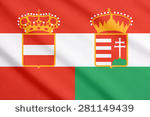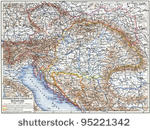dict.cc
⇄
⇄
Advertisement
Translation for 'Austro-Hungarian Empire' from English to Slovak
- Austro-Hungarian Empire
- Rakúsko-uhorská monarchia {f}hist.pol.
- Austro-Hungarian
- rakúsko-uhorský {adj}hist.
- Advertisement
- Hungarian
- maďarčina {f}jazyk.
maďarský {adj}
Maďar {m}etn. - Hungarian [female]
- Maďarka {f}etn.
- Hungarian language
- maďarčina {f}jazyk.
maďarský jazyk {m}jazyk. - empire
- cisárstvo {n}
ríša {f}
impérium {n} - Aztec empire
- Aztécka ríša {f}hist.
- Parthian Empire
- Partská ríša {f}hist.
- Roman Empire
- Rímska říša {f}geogr.hist.
- Chaldean Empire
- Chaldejská ríša {f}hist.
- Chaldaean Empire
- Chaldejská ríša {f}hist.
- Seleucid Empire
- Seleukovská ríša {f}hist.
- Achaemenid Empire
- Ríša {f} Achajmenovcovhist.
Staroperzská ríša {f}hist. - Frankish Empire
- Franská ríša {f}hist.
- Inca Empire
- Inkská ríša {f}hist.
Usage Examples English
See more ...
- The Austro-Hungarian Empire then withdrew from all defeated countries.
- The Serbs developed a larger vision for nationalism in Pan-Slavism and with Russian support sought to pull the other Slavs out of the Austro-Hungarian Empire.
- At the start of the war, the Central Powers consisted of the German Empire and the Austro-Hungarian Empire.
- The area was part of the Austro-Hungarian Empire until it collapsed at the end of World War I.
- During this time period two main types of literature were produced: Biedermeier literature, which strove to educate the readers and encourage them to be loyal to the Austro-Hungarian Empire (e.g. ...
- Most of the Balkan nation-states emerged during the 19th and early 20th centuries as they gained independence from the Ottoman Empire or the Austro-Hungarian empire: Greece in 1821, Serbia, and Montenegro in 1878, Romania in 1881, Bulgaria in 1908 and Albania in 1912.
- then Austro-Hungarian Empire (now Lviv, Ukraine).
- Following World War I and the dissolution of the Austro-Hungarian Empire, Salzburg, as the capital of one of the Austro-Hungarian territories, became part of the new German Austria.
- The Habsburg Empire survived as the Austro-Hungarian Empire until it was dissolved 3 November 1918 – 399 years 11 months and 9 days after the passing of Maximilian.
- It is sometimes said to have been born in the coffee houses of Trieste and other Italian areas of the Austro-Hungarian Empire in the early 20th century, spreading throughout Italy after World War I and later worldwide.
- The name "dravite" was used for the first time by Gustav Tschermak (1836–1927), Professor of Mineralogy and Petrography at the University of Vienna, in his book "Lehrbuch der Mineralogie" (published in 1884) for magnesium-rich (and sodium-rich) tourmaline from village Dobrova near Unterdrauburg in the Drava river area, Carinthia, Austro-Hungarian Empire.
- Agnon was born in Polish Galicia, then part of the Austro-Hungarian Empire, and later immigrated to Mandatory Palestine, and died in Jerusalem.
- He deplored the social conditions under the Austro-Hungarian Empire and foresaw its disappearance.
- It was an important city to the Habsburg monarchy and Austro-Hungarian Empire.
- Einstein became a full professor at the German Charles-Ferdinand University in Prague in April 1911, accepting Austrian citizenship in the Austro-Hungarian Empire to do so.
- It originally constituted part of a larger classification of three groupings of Germans within the Austro-Hungarian Empire, which also included "Alpine Deutschen" [...] ("Alpine Germans") in what later became the Republic of Austria and "Balkandeutsche" [...] ("Balkan Germans") in Hungary and the regions east of it.
- Consular Agent from 1903 to 1906, when the city was known as Fiume and was under Hungarian administration.
Advertisement

